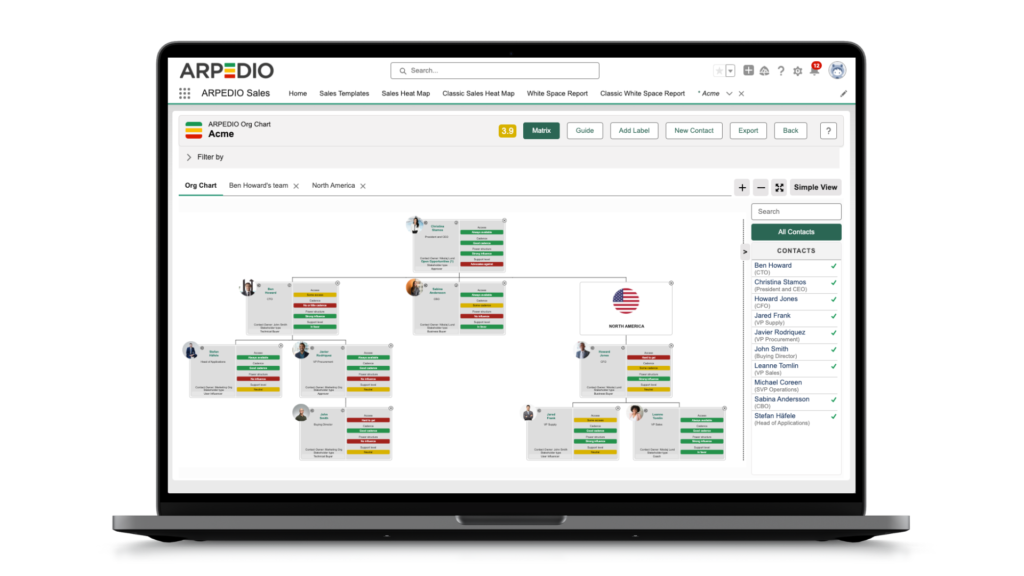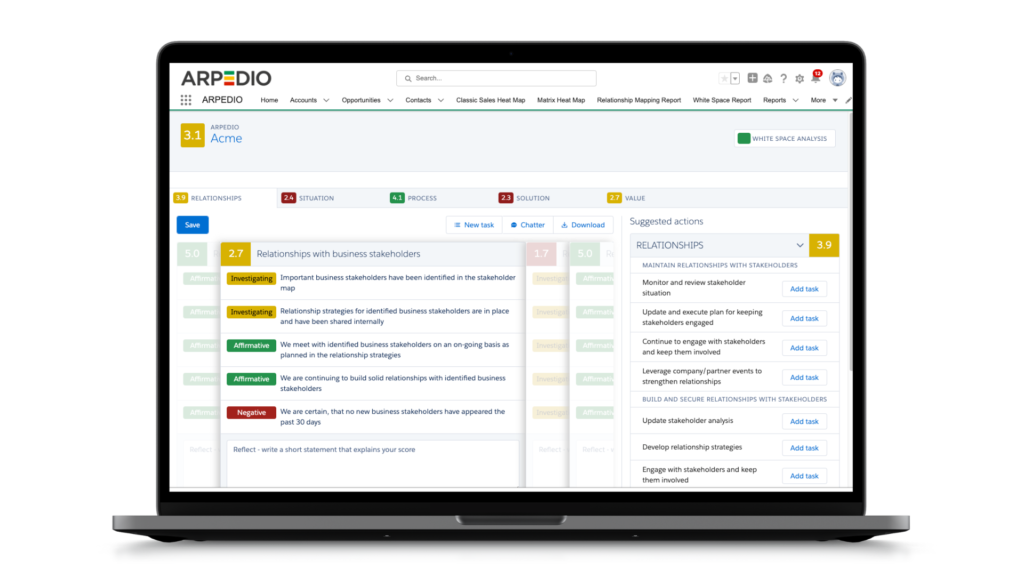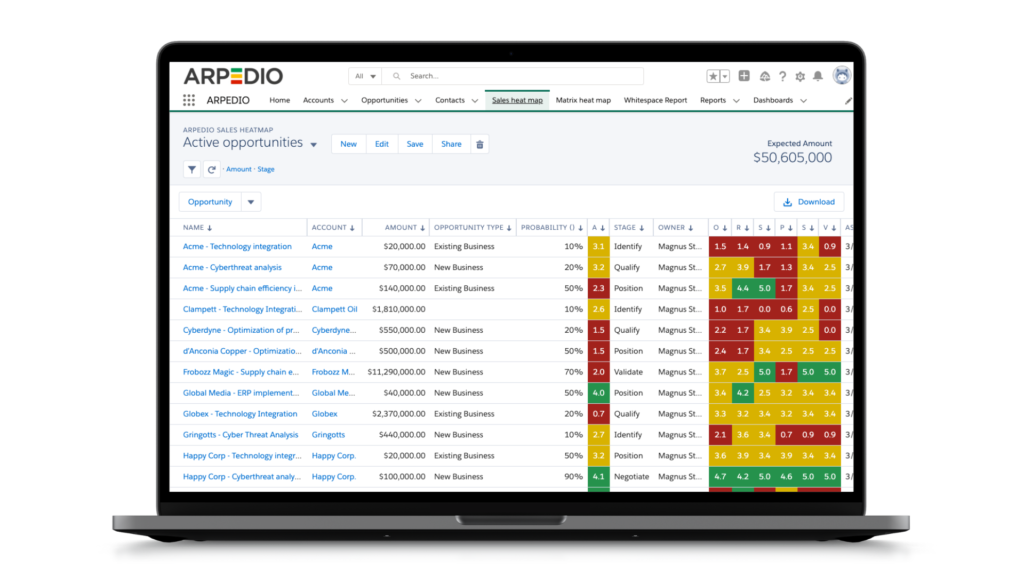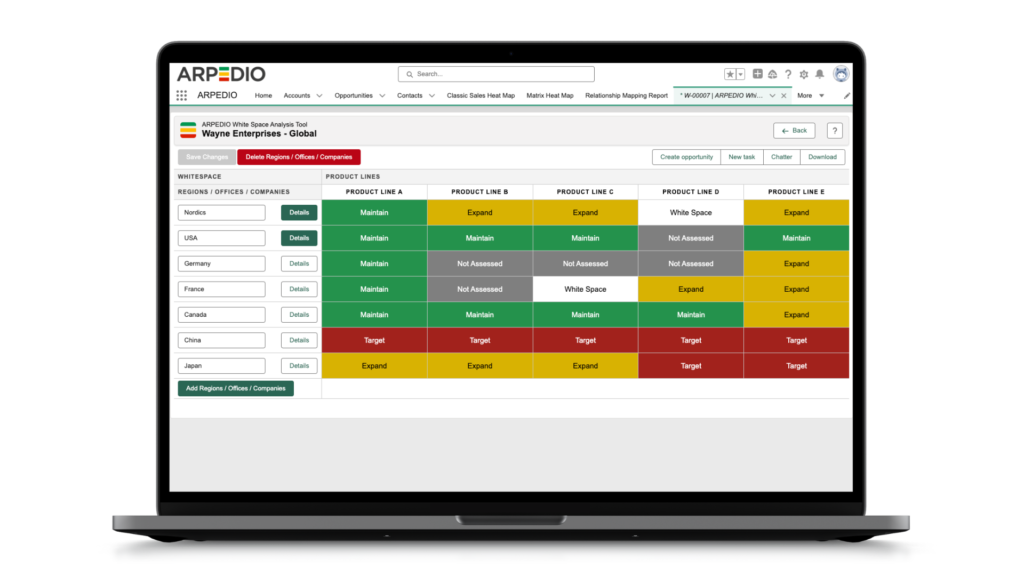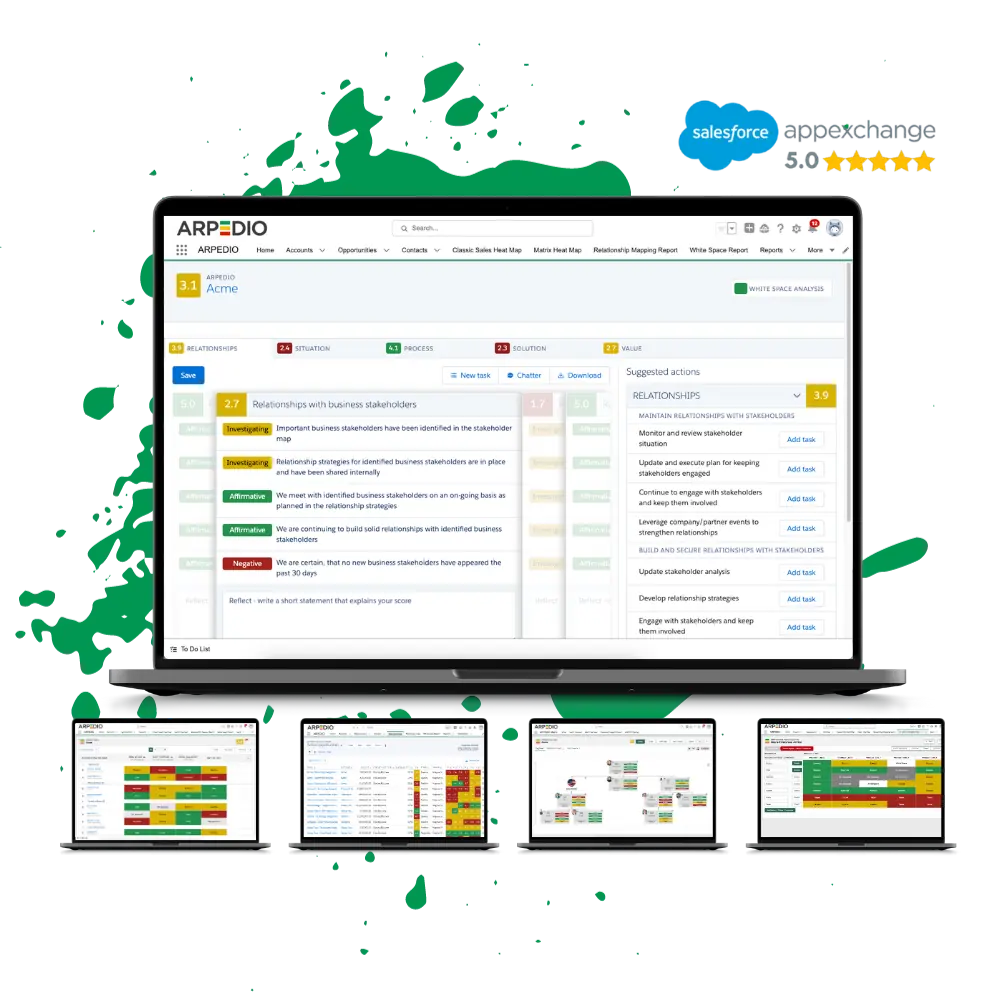The Urgency of Change: Why B2B Sales Must Adapt Now
The B2B sales landscape is undergoing a fundamental shift. Economic pressures and AI disruption are reshaping sales strategies, forcing organizations to rethink how they generate revenue. Winning new business and expanding existing accounts is more challenging than ever, making it crucial for sales teams to prioritize the right accounts instead of casting a wide net.
Companies that fail to adapt to these changes risk falling behind. Boards are scrutinizing budgets, demanding efficiency, and prioritizing strategic investments. Meanwhile, AI is changing traditional sales workflows, but its effectiveness depends on having structured data and a solid strategic foundation – without this, AI can mislead rather than enable.
McKinsey research shows that account-based selling (ABS) has evolved more in the past two years than in the last decade. Companies that successfully implement ABS see higher customer lifetime value (LTV) and stronger retention rates, making it an essential strategy for sustainable growth.
ARPEDIO’s Leadership Forum
This urgency to adapt was the focal point of the recent ARPEDIO Leadership Forum in Paris, an exclusive, invite-only event designed for top sales leaders. With limited seats to ensure high-value discussions and meaningful networking, the forum brought together over 40 hand-selected decision-makers from leading organizations. On stage, Sodexo joined ARPEDIO to share how they are navigating these shifts, sparking in-depth conversations on critical challenges and opportunities. Key discussion themes included:
- The need to prioritize strategic accounts rather than spreading sales resources too thin.
- The challenge of aligning internal teams and the role of leadership.
- Turning ABS strategy into execution.
- The role of AI and data-driven decision-making in the future of sales.
Sodexo’s Realization: Even Market Leaders Must Evolve
As a global leader with 27,000 clients and €23.8 billion in revenue, Sodexo built its success on a deep culture of service and client-centricity. However, this commitment to meeting client needs also posed a challenge – sales teams often prioritized responsiveness over strategic focus.
To sustain profitable growth, Sodexo recognized that it needed to combine its service excellence with a more structured, data-driven approach to account strategy. The shift to an account-based sales model enabled them to:
- Focus on high-value accounts while maintaining service quality.
- Foster deeper collaboration across client-facing teams.
- Implement a dynamic, real-time account planning system within Salesforce using ARPEDIO, bringing structure to decision-making while remaining flexible to client needs.
This shift was crucial as competitors became more aggressive in key markets and sales productivity became a leadership priority. Sodexo’s journey highlights the broader challenges many organizations face when transitioning to a more focused, account-based strategy.
Let’s explore the key insights shared during the leadership forum and how Sodexo navigated complexities in evolving their sales approach to drive growth.
Challenge 1: Focus and Prioritization in an Uncertain Market
In today’s uncertain market, many companies face the challenge of managing their sales efforts in a way that balances opportunity with efficiency. The fear of missing out on potential revenue often drives organizations to pursue every opportunity, even at the cost of spreading sales resources too thin. While the desire to engage with every potential client is understandable, this approach can backfire – leading to inefficiency, slower decision-making, and a lack of deep, meaningful client relationships.
As businesses grapple with tightened budgets and greater scrutiny on investments, it’s crucial to prioritize where sales resources are invested. The real question companies must answer is: How do we identify and focus on the right accounts and opportunities that will ensure long-term growth and sustainability?
The need for focus becomes even more critical when considering both new business and existing accounts. While securing new business is essential, organizations are finding that pursuing volume isn’t as valuable as pursuing the right opportunities. In fact, expanding key strategic accounts – those already within your portfolio – is just as important as securing new ones. Companies that successfully grow within existing accounts often see higher customer lifetime value (LTV) and stronger retention rates.
With boards demanding greater efficiency in go-to-market strategies, sales teams must be highly selective in which deals, accounts, and opportunities they pursue. This requires a disciplined approach to focus efforts where they will have the most impact – maximizing returns while avoiding the trap of chasing every possible opportunity.
Insights from the Leadership Forum: Common Challenges in Account Selection and Internal Collaboration
At ARPEDIO’s recent Leadership Forum in Paris, several industry leaders shared the challenges they face in selecting and prioritizing key accounts and opportunities. A common theme was the inconsistency in approaches within organizations. While many companies have identified high-value accounts, they often struggle with aligning teams across sales, marketing, and customer success to define clear ownership and collaboration processes.
Some participants also noted that fragmented sales operations and regional structures often hinder the implementation of a unified account-based sales (ABS) strategy, leading to siloed decision-making and duplicated efforts. This lack of alignment and consistency creates challenges in staying focused on the most strategic opportunities.
A key challenge discussed was ensuring alignment between leadership and sales teams on which accounts and opportunities to prioritize. Without this alignment, teams are often forced into a reactive mode, responding to inbound requests instead of proactively pursuing high-value strategic opportunities.
Sodexo’s Approach: A Data-Driven, Structured Approach to Prioritization
Sodexo’s experience underscores the importance of a structured and strategic approach to account prioritization. While Sodexo’s strong client responsiveness had long been a strength, the company recognized that to continue driving growth, it needed a more disciplined approach to segmenting accounts and selecting new business opportunities.
By adopting a data-driven segmentation strategy, Sodexo focused first on its top clients – the small percentage of accounts that generated the majority of its revenue – while also targeting high-value prospects. This approach ensured that sales resources were concentrated on high-impact opportunities, rather than being spread too thinly across a large volume of lower-value leads. They also refined their selection process for RFPs and new business opportunities, emphasizing quality over quantity.
Sodexo also recognized that a lack of alignment in their sales tech stack was hindering this effort. An internal survey revealed dissatisfaction with their existing account planning tool, which led them to issue an RFP for a new solution that prioritized dynamic collaboration, a user-friendly experience, and process simplicity.
The Role of ARPEDIO in Driving Focus and Prioritization
Sodexo’s implementation of ARPEDIO’s ABS platform within Salesforce has been pivotal in transforming their sales strategy. With this solution, they were able to:
- Systematically segment and classify accounts, ensuring that resources were allocated effectively and strategically.
- Create clear, simple, and structured account plans that are dynamic and actionable, providing teams with a roadmap for success.
- Improve internal collaboration by providing a centralized, real-time view of key accounts and strategic opportunities across sales, marketing, and operations, breaking down silos and fostering alignment.
This data-driven approach to account segmentation and strategic planning has helped Sodexo move from a reactive state to a process that is focused, efficient, and aligned with business priorities – ensuring that sales resources are invested where they will generate the highest return.
Challenge 2: Breaking Down Silos for Effective Sales and Account Management
In many organizations, sales, account management, field teams, HQ teams, and operations often operate in silos. This fragmentation leads to a lack of alignment, making it difficult to create a cohesive strategy for managing and growing key accounts. Sales teams, focused on closing deals, may pursue opportunities without a clear understanding of the long-term account strategy, while account management and operations teams focus primarily on delivering value after the sale. Without a coordinated approach, growth opportunities can be overlooked, and clients may not receive the level of engagement they need to thrive.
Moreover, differing perspectives on account priorities across field teams, HQ, and leadership often result in inconsistent decision-making. Without alignment across these teams, efforts can become duplicated, and resources may be misused. This misalignment is especially problematic when selling to strategic accounts, where success relies heavily on cross-functional collaboration.
Successful ABS Requires Cross-Functional Collaboration and Shared Ownership
True account-based selling isn’t just a sales initiative; it’s a company-wide effort that requires full engagement from all client-facing teams – sales, marketing, customer success, operations – and leadership. To implement ABS successfully, organizations must treat account plans as dynamic, collaborative strategies that evolve over time, rather than static documents owned by one team. When all relevant business units contribute to the account strategy, organizations can ensure that accounts are not only won but are also grown strategically over time.
Cross-functional engagement ensures that all departments work toward common goals, rather than pursuing separate objectives. This collaboration is key to creating a unified approach to managing high-value accounts, driving growth, and improving overall customer satisfaction.
Insights from the Leadership Forum: Challenges in Integrating Business Models, Tool Adoption, and Securing Leadership Sponsorship
At ARPEDIO’s Leadership Forum, discussions revealed several common challenges when trying to implement ABS effectively. One key issue many organizations face is differing sales models across business units, which makes it difficult to align on a consistent account strategy. Additionally, while some companies are adopting new ABS tools, they struggle with integration into existing workflows, leading to poor adoption rates among teams.
A recurring theme was the need for executive sponsorship. While many organizations gain initial leadership buy-in for ABS, they struggle to secure ongoing executive support, which is essential for ensuring accountability, adoption, and successful execution. Without strong leadership commitment, ABS efforts can falter, and organizations miss the opportunity to embed this strategy into their culture.
Sodexo’s Approach: Collaborative Account Plans, Web of Influence Mapping, and C-Level Sponsorship
Sodexo recognized early on that the success of ABS depended on breaking down silos and fostering a truly collaborative approach to account planning. To achieve this, they:
- Made account plans dynamic and collaborative by ensuring that sales, retention teams, and operations worked together seamlessly within ARPEDIO, natively inside Salesforce. This approach facilitated real-time updates and ensured everyone was on the same page.
- Implemented web of influence mapping to assess the strength of relationships, stakeholder engagement, and strategic gaps within key accounts. This allowed the team to understand the key influencers in each account and identify opportunities for deeper engagement.
- Secured C-level sponsorship at every stage, ensuring leadership wasn’t just talking about the importance of ABS but was actively embedding it into the company’s strategic priorities and KPIs. This ensured alignment from top to bottom, with leadership driving the accountability and commitment needed for ABS success.
The result of this integrated, collaborative approach? Better internal coordination, clearer accountability, and stronger client relationships. By ensuring that all teams were working together toward common goals, Sodexo was able to position itself for sustainable growth, both within existing accounts and new business opportunities. This cross-functional approach to ABS has helped them maintain a competitive edge while delivering superior value to their clients.
Challenge 3: Turning Strategy into Execution
While many companies recognize the importance of account-based selling (ABS), the true challenge lies in turning strategy into execution. Account plans are often created with great detail, but without integration into daily workflows, these plans can become static documents – quickly outdated or ignored. This leads sales teams to continue operating reactively, focusing on immediate deals rather than working toward long-term strategic account goals. The key is ensuring that account plans evolve dynamically, remain actionable, and drive measurable outcomes.
Execution Fails When There Is No Real-Time Tracking or Accountability
The success of ABS relies on execution, and without real-time visibility, it’s difficult to track progress, identify risks, or adjust strategies accordingly. Unfortunately, many companies rely on disconnected tools like PowerPoint presentations, spreadsheets, or information stored only in account owners’ heads, making it difficult to update account plans efficiently or ensure team alignment. This lack of real-time tracking leads to accountability gaps, where actions and responsibilities are not clearly assigned, resulting in missed opportunities and stalled execution.
To truly drive impact, organizations need a structured way to monitor account progress, measure impact, and keep teams engaged with the execution of the plan. Without this structure, it’s easy for plans to become inactive or out of sync with actual progress.
Insights from the Leadership Forum: How Participants Are Making Account Planning a Business Priority
At the ARPEDIO Leadership Forum, discussions revealed that while many organizations understand the importance of account planning, they struggle with consistent execution. A key theme that emerged was the need to embed account planning into broader commercial strategies rather than treating it as a one-time exercise. To make account planning successful, clear leadership accountability, technology enablement, and cultural adoption across teams are critical.
There is growing interest in AI and automation to support execution, but many companies recognize that AI alone cannot solve the problem. Without foundational data and discipline in account planning and execution, AI will not be able to support sales teams.
Sodexo’s Approach: Account Scorecards, Embedded Action Plans, and Salesforce-Driven Execution
Sodexo recognized that execution was the weak link in their ABS strategy, so they focused on creating a system that would track and act on account insights in real time. Their solution was centered around three key elements:
Account Scorecards: Sodexo implemented account scorecards to provide a structured, visual way to assess and monitor account health. These scorecards evaluate key factors such as relationship strength, strategic alignment, and commercial potential. By having an easily understandable and dynamic view of account health, Sodexo’s teams could prioritize their efforts effectively, ensuring that the most strategic accounts received the attention they needed. The value here is clear: it allows teams to quickly identify at-risk accounts and areas of opportunity, enabling proactive management.
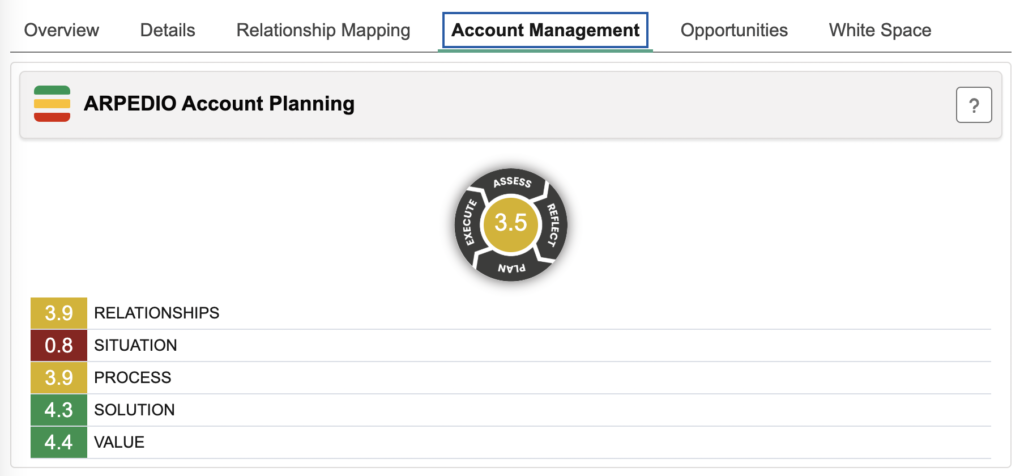
Embedded Action Plans: Rather than treating account plans as static documents, Sodexo turned them into dynamic, actionable tools. These plans now include clearly defined tasks, assigned owners, and deadlines, ensuring that everyone involved in the account’s success understands their responsibilities. By embedding action plans within the account strategy, the team could ensure that the plan was not just a document, but a living, breathing tool that directly drove execution. This added significant value by turning strategy into action with clearly defined next steps.
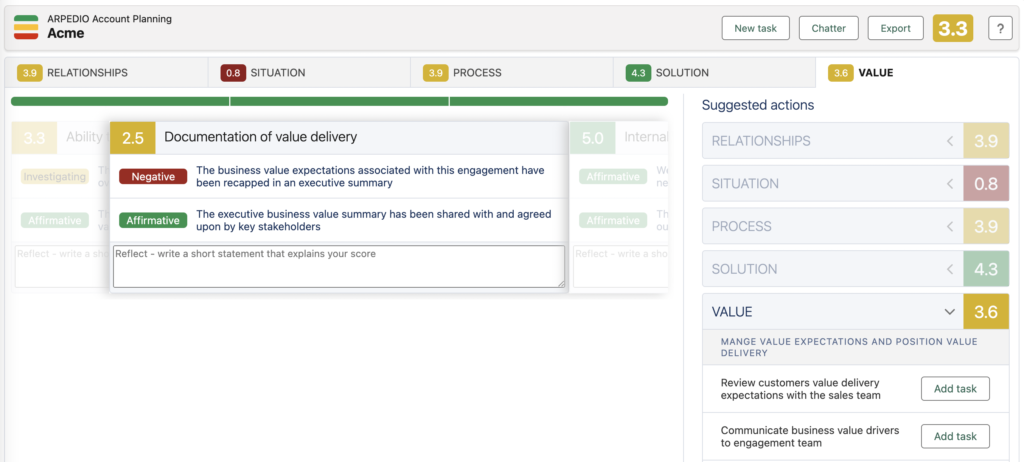
Salesforce-Driven Execution: To make account planning part of the daily workflow, Sodexo fully integrated ABS into Salesforce, enabling real-time tracking and progress monitoring at the account and opportunity level. This integration automated reminders, created a seamless flow of information, and provided leadership with full visibility into account health and progress. As a result, team members could focus on what mattered most – advancing the account strategy – while automated processes ensured that no tasks were missed. The value of Salesforce-driven execution was immense: it aligned teams, provided real-time updates, and allowed leadership to engage in more productive, informed discussions.
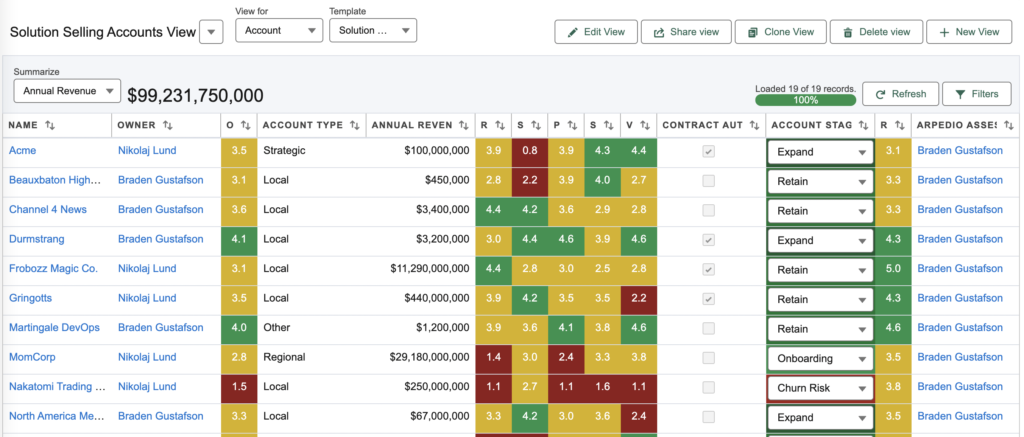
The Result?
Sodexo’s approach led to stronger internal coordination, greater accountability, and measurable improvements in account growth and retention. By turning account plans into dynamic, actionable strategies that were integrated into daily workflows, Sodexo was able to drive sustained growth in both existing accounts and new business opportunities, ensuring that their ABS strategy delivered on its full potential.
Want to see how it all comes together? Explore the ARPEDIO Account-Based Selling platform in action with a short demo and see how it supports dynamic, data-driven account planning.
Challenge 4: The Risk of AI as a Quick Fix Without Proper Governance
AI adoption is accelerating across sales organizations, but its effectiveness in complex B2B sales depends entirely on the quality of the data it processes. Without reliable, structured data, AI can mislead teams instead of enabling them, amplifying inefficiencies rather than solving them.
Many companies are investing in AI with high expectations, believing it can solve sales challenges overnight. However, AI is currently at the peak of the hype cycle (as illustrated in Gartner’s Hype Cycle for AI), meaning enthusiasm often outpaces the technology’s real-world maturity and readiness for strategic execution. AI cannot, in any case, replace strategic thinking – it must be used as an enabler within a well-governed framework.
Insights from the Leadership Forum: Industry Perspectives on AI in ABS
Discussions at the ARPEDIO Leadership Forum revealed that while many companies are eager to integrate AI into their account-based selling (ABS) strategies, most are still refining how to do so effectively:
- Several participants shared that they already use AI for research, meeting transcriptions, and engagement scoring, but they struggle with automation in account planning and CRM data population.
- Leaders expressed concerns about data accuracy, emphasizing that AI-driven insights are only as good as the underlying data.
- A key takeaway was the importance of refining account planning processes before layering AI on top. Without a structured foundation, AI risks amplifying existing inefficiencies rather than driving meaningful improvements.
Sodexo’s Approach: Ensuring Data Accuracy First, Then Leveraging AI for Predictive Insights
Sodexo recognized that AI would only be valuable if built on a foundation of reliable data and strong governance. Their approach to AI in ABS focused on three key areas:
- Data Discipline First: Before implementing AI, Sodexo ensured that all account data was structured, accurate, and aligned with business objectives. This disciplined approach reduced inconsistencies and created a solid foundation for AI-driven insights.
- Predictive Insights for ABS: Once data integrity was established, Sodexo used AI to identify patterns in account performance, stakeholder engagement, and deal conversion likelihood. These predictive insights helped sales teams prioritize the right accounts and opportunities with greater confidence.
AI as an Enabler, Not a Decision-Maker: AI-generated recommendations were integrated into Salesforce but always required human validation. This ensured that automation supported, rather than replaced, strategic decision-making, mitigating the risks of over-reliance on AI.
By prioritizing data governance and thoughtful AI integration, Sodexo ensured that AI enhanced – not replaced – its ABS strategy. This approach led to smarter account prioritization, better stakeholder engagement, and more effective resource allocation, allowing Sodexo to leverage AI as a true enabler of growth.
Conclusion: Why the Time to Act Is Now
Amidst today’s volatile market conditions, account-based selling (ABS) is no longer a luxury – it’s a necessity. With longer sales cycles, intensified budget scrutiny, and increasing competition, companies can no longer afford to spread their sales efforts too thin. Traditional volume-based sales tactics are losing effectiveness, and organizations that fail to adapt risk losing market share, wasting resources on low-priority deals, and struggling to retain their most valuable customers.
The Companies Leading in ABS Are Already Seeing Measurable Impact
Forward-thinking organizations that have embraced ABS with the right focus, processes, and technology are already seeing higher revenue, stronger customer retention, and improved sales efficiency.
Take Sodexo, for example. By streamlining its account selection process, aligning teams around clear priorities, and leveraging technology to turn strategy into execution, Sodexo achieved better pipeline visibility, increased efficiency, and stronger client relationships.
Discussions at the ARPEDIO Leadership Forum reinforced this trend. Companies that are actively working on ABS adoption are outpacing their competitors in key areas like sales efficiency, customer lifetime value, and win rates on strategic RFPs.
How to Take the First Steps Toward ABS Excellence
For organizations looking to refine their approach to ABS, here are the key takeaways from industry leaders:
- Step 1: Prioritize the Right Accounts
Focus on both strategic existing accounts and high-value new business opportunities – chasing volume without direction is a recipe for inefficiency.
- Step 2: Ensure Cross-Functional Alignment
True ABS success happens when sales, account management, operations, and leadership work from a shared, dynamic account plan.
- Step 3: Move from Static Planning to Execution
Account plans should be living, actionable tools integrated into daily workflows – not static documents that get ignored.
- Step 4: Use Technology as an Enabler, Not a Quick Fix
Platforms like ARPEDIO within Salesforce help teams maintain discipline in account planning, track progress in real time, and drive seamless collaboration.
- Step 5: Adopt AI with a Clear Strategy
AI can enhance decision-making and predict opportunities, but only when built on clean, structured data and human oversight – not as an unchecked automation tool.
The time to act is now! The companies that take decisive steps now to refine their ABS strategy will not only navigate today’s challenges more effectively, but also position themselves for long-term, sustainable growth.




